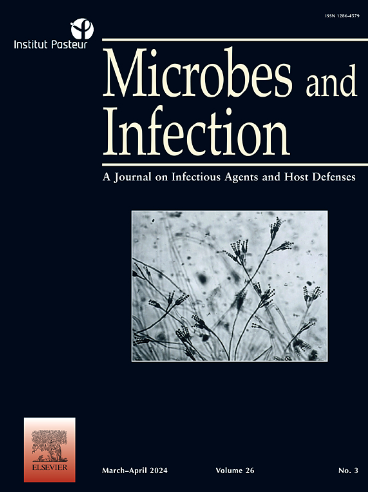The SARS-CoV-2 antibody-dependent enhancement façade
IF 2.7
4区 医学
Q3 IMMUNOLOGY
引用次数: 0
Abstract
Antibody-dependent enhancement (ADE) is an immunological paradox whereby sensitization following a primary viral infection results in the subsequent enhancement of a similar secondary infection. This idiosyncratic immune response has been established in dengue virus infections, driven by four antigenically related serotypes co-circulating in endemic regions. Several coronaviruses exhibit antibody-mediated mechanisms of viral entry, which has led to speculation of an ADE capacity for SARS-CoV-2, though in vivo and epidemiological evidence do not currently support this phenomenon. Three distinct antibody-dependent mechanisms for SARS-CoV-2 entry have recently been demonstrated: 1. FcR-dependent, 2. ACE2-FcR-interdependent, and 3. FcR-independent. These mechanisms of viral entry may be dependent on SARS-CoV-2 antibody specificity; antibodies targeting the receptor binding domain (RBD) typically result in Fc-dependent and ACE2-FcR-interdependent entry, whereas antibodies targeting the N-terminal domain can induce a conformational change to the RBD that optimizes ACE2-receptor binding domain interactions independent of Fc receptors. Whether these antibody-dependent entry mechanisms of SARS-CoV-2 result in the generation of infectious progenies and enhancement of infection has not been robustly demonstrated. Furthermore, ADE of SARS-CoV-2 mediated by antigenic seniority remains a theoretical concern, as no evidence suggests that SARS-CoV-2 imprinting blunts a subsequent immune response, contributing to severe COVID-19 disease.
SARS-CoV-2抗体依赖性增强实验
抗体依赖性增强(ADE)是一个免疫学悖论,即原发性病毒感染的致敏导致随后类似继发性感染的增强。这种特异性免疫反应已在登革热病毒感染中得到证实,它是由流行地区共流行的四种抗原相关血清型驱动的。几种冠状病毒表现出抗体介导的病毒进入机制,这导致人们猜测SARS-CoV-2具有ADE能力,尽管体内和流行病学证据目前尚不支持这一现象。最近已经证明了SARS-CoV-2进入的三种不同的抗体依赖机制:FcR-dependent 2。2 . ace2 - fcr相互依赖;FcR-independent。这些病毒进入机制可能依赖于SARS-CoV-2抗体特异性;靶向受体结合域(RBD)的抗体通常导致Fc依赖和ace2 - fcr依赖的进入,而靶向n端结构域的抗体可以诱导RBD的构象变化,从而优化ace2受体结合域的相互作用,而不依赖于Fc受体。SARS-CoV-2的这些抗体依赖的进入机制是否导致感染性后代的产生和感染的增强尚未得到有力证明。此外,抗原优先性介导的SARS-CoV-2 ADE仍然是一个理论上的问题,因为没有证据表明SARS-CoV-2印记会减弱随后的免疫反应,从而导致严重的COVID-19疾病。
本文章由计算机程序翻译,如有差异,请以英文原文为准。
求助全文
约1分钟内获得全文
求助全文
来源期刊

Microbes and Infection
医学-病毒学
CiteScore
12.60
自引率
1.70%
发文量
90
审稿时长
40 days
期刊介绍:
Microbes and Infection publishes 10 peer-reviewed issues per year in all fields of infection and immunity, covering the different levels of host-microbe interactions, and in particular:
the molecular biology and cell biology of the crosstalk between hosts (human and model organisms) and microbes (viruses, bacteria, parasites and fungi), including molecular virulence and evasion mechanisms.
the immune response to infection, including pathogenesis and host susceptibility.
emerging human infectious diseases.
systems immunology.
molecular epidemiology/genetics of host pathogen interactions.
microbiota and host "interactions".
vaccine development, including novel strategies and adjuvants.
Clinical studies, accounts of clinical trials and biomarker studies in infectious diseases are within the scope of the journal.
Microbes and Infection publishes articles on human pathogens or pathogens of model systems. However, articles on other microbes can be published if they contribute to our understanding of basic mechanisms of host-pathogen interactions. Purely descriptive and preliminary studies are discouraged.
 求助内容:
求助内容: 应助结果提醒方式:
应助结果提醒方式:


